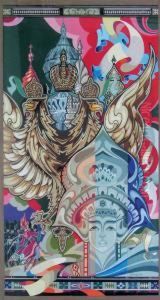Nikolai Pavlovitch Oulianov Paintings
Nikolai Pavlovitch Oulianov, born in 1873, is historically recognized not for his own achievements in the arts or any particular professional field, but rather for his familial connection to one of the most pivotal figures in Russian and world history. Nikolai was the younger brother of Vladimir Lenin, the founder of the Russian Communist Party, leader of the Bolshevik Revolution, and the architect of the Soviet state. Despite his potential, Nikolai's life was tragically cut short, and he died in 1887 at the age of 14. The Oulianov family was known for its intellectual environment, which undoubtedly had a profound impact on all the children, including Nikolai. The siblings were raised in Simbirsk (now Ulyanovsk), a town along the Volga River, in a well-educated and politically active family. Their father, Ilya Nikolayevich Ulyanov, was a high-ranking education official, which provided the children with an environment rich in academic and political discussion. This background played a crucial role in shaping the ideological convictions of Lenin himself, and though Nikolai's life was too short to contribute actively to these discussions or the historical events that followed, the familial and social milieu he was part of inevitably contributed to the shaping of revolutionary ideas within his more famous brother. Nikolai's premature death from illness left a profound impact on his family, especially on Vladimir, who was deeply affected by the loss of his younger brother. It is believed that this personal tragedy was one of the factors that fueled Lenin's revolutionary zeal. While Nikolai Pavlovitch Oulianov's direct contributions to history may not be recorded in the annals of significant achievements, his life and early death are inseparable from the context that led to the emergence of one of the 20th century's most influential political leaders. In a sense, Nikolai's legacy is intangibly woven into the fabric of the societal and political upheaval that would later engulf Russia and the world.
